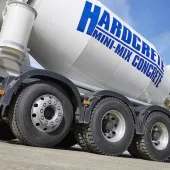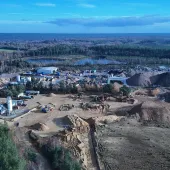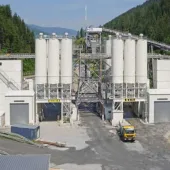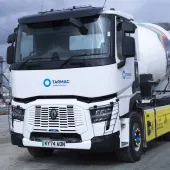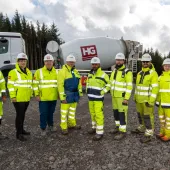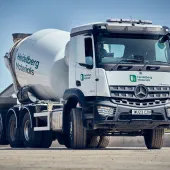Lafarge Tarmac roll out new wash-out system for mixer trucks
Integrated wash-out system now standard on all new concrete mixer trucks improving road safety and site cleanliness
LAFARGE Tarmac have become the first company in the sector to specify an innovative, integrated wash-out system as standard on all their new ready-mixed concrete trucks – helping to boost resource efficiency, minimize waste and improve road safety.
Developed by McPhee Mixers, the Spill Stopper wash-out system is integrated into the truck’s design, helping to prevent any waste that develops from the chute of a concrete mixer in transit from escaping on to roads. According to Lafarge Tarmac, the trucks are washed out anywhere, at any time, contributing to quicker turnaround of the vehicle.
It works by separating solids from wastewater and containing the materials within an enclosed system. Hauliers are able to wash out and transport wastewater and excess concrete safely back to one of Lafarge Tarmac’s nationwide network of ready-mixed plants to be processed, recycled and re-used.
Jeremy Greenwood, managing director for Lafarge Tarmac Readymix, said: ‘Delivering customer-focused sustainable solutions is core to our business and this new wash-out technology enables us to further improve site cleanliness and road safety, whilst also supporting our corporate commitment to resource efficiency. The system helps us to manage valuable resources like water and concrete, and re-use them to make new products.’
The wash-out system has already been fitted on to the company’s latest order of 30 new mixers, and will be specified as standard on all new mixers going forward. The fit-out of the system across the company’s entire 350-strong concrete mixer fleet will take six years to complete.
In addition, Lafarge Tarmac are exploring a range of alternative retrofit measures to manage and prevent spillage from their existing fleet, such as concrete socks and stoppers that help collect any spillage.
The unique Spill Stopper system is part of Lafarge Tarmac’s ongoing commitment to improving safety and to managing finite resources such as water, cement and aggregates in an efficient way. The company has set a target to reduce water consumption per unit of production by 25% by 2020 and it is focused on reducing waste from every stage of the product life cycle.



